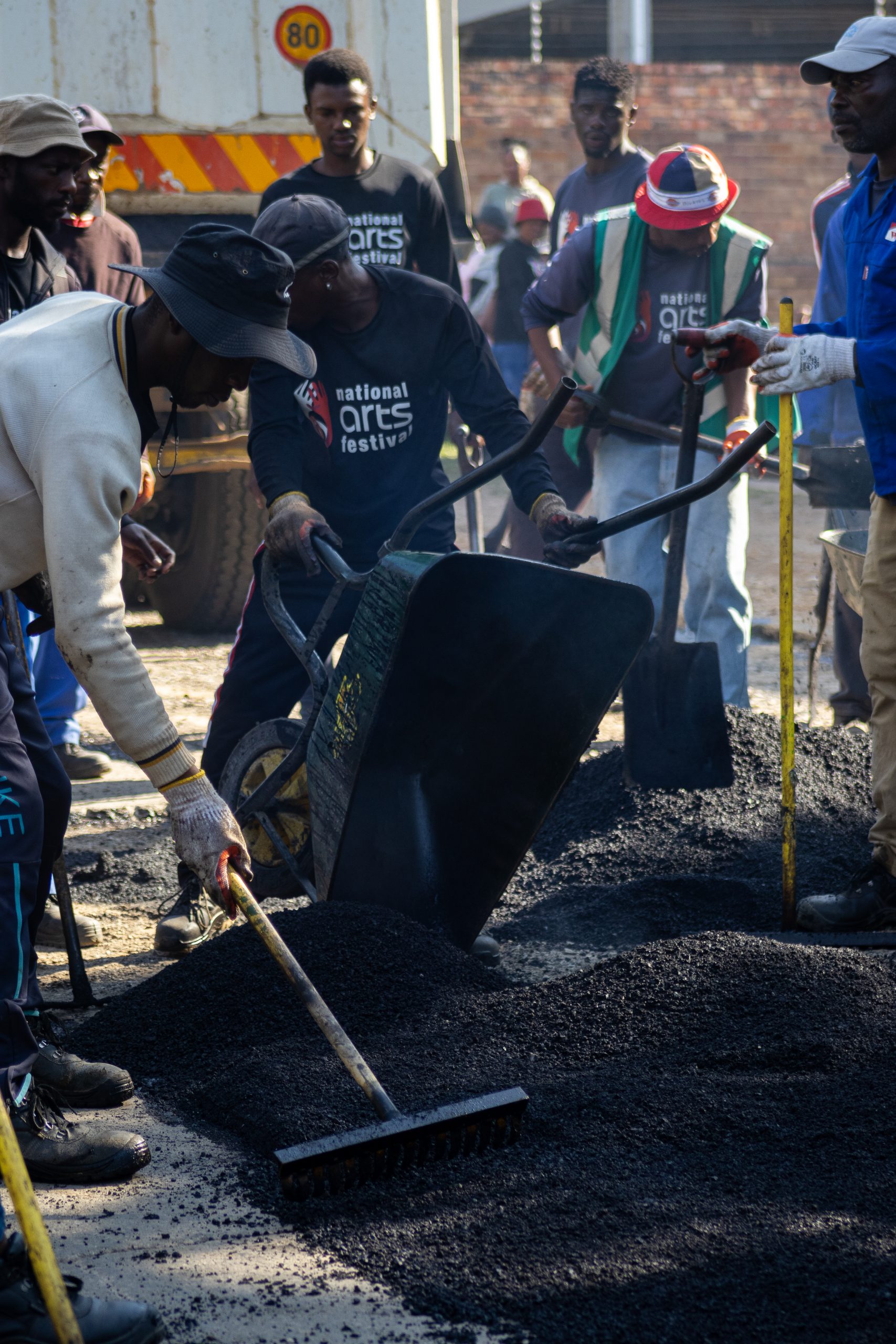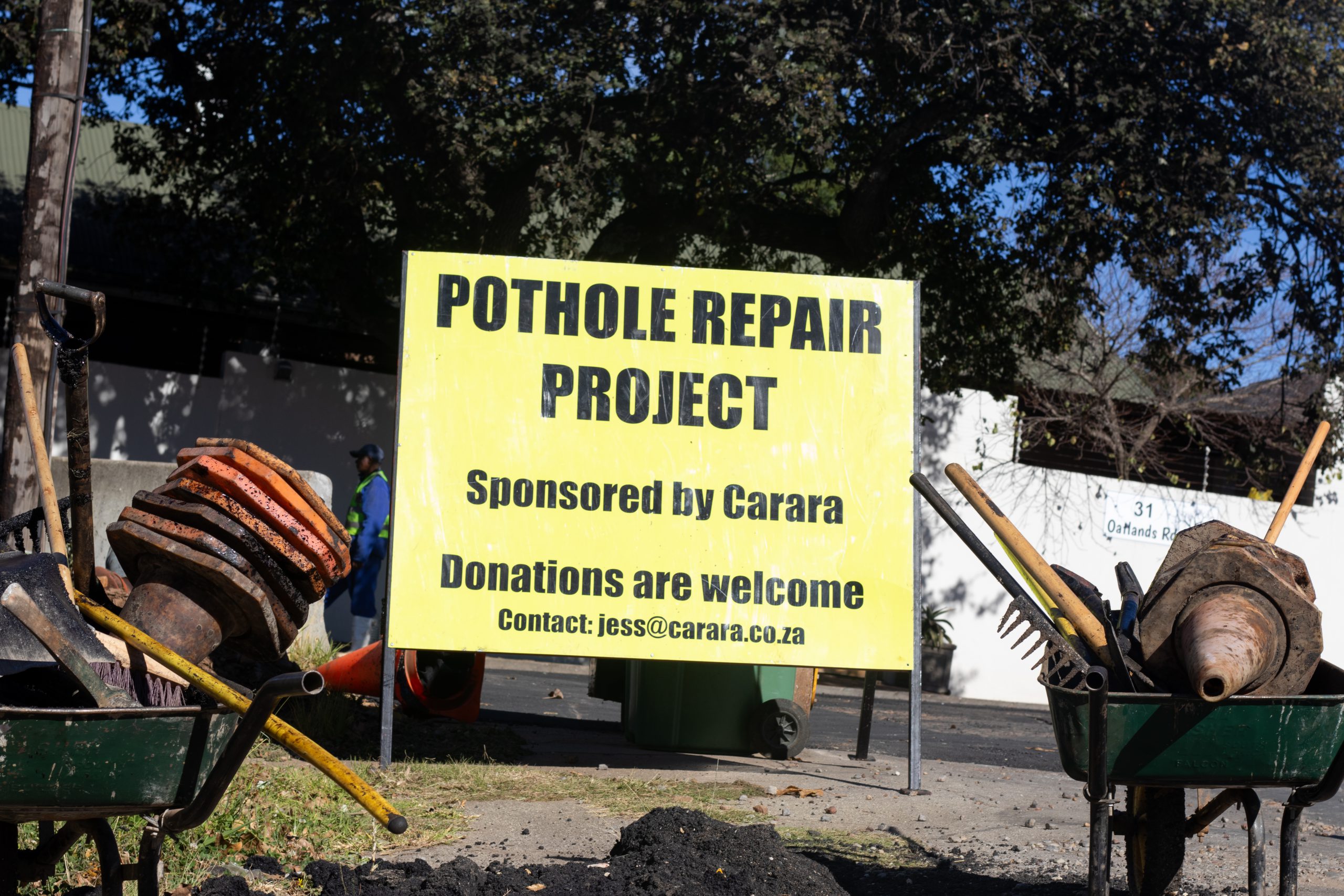By Rikie Lai
Makhanda roads are in a sorry state, a glaring sign of shortcomings in service delivery and infrastructure maintenance.
Over recent years, the Makana Municipality has had numerous projects to try and address the issues. However, delays and challenges have hindered progress. Considering this, other organisations and entities have undertaken similar projects to also address these issues.

Many independent and private entities have taken it upon themselves to repair the roads in Makhanda. In 2022, non-profit organisations were asked to send proposals to employ individuals and Hilton Haakonsen, the projects manager of the Social Employment Fund (SEF) in collaboration with the National Arts Festival, to create employment and assist in producing labour for necessary maintenance and repair. Haakonsen has formed eight teams and each has a qualified individual to address the issues that are involved in these eight separate aspects. These teams are separated to address issues such as refuse collection, illegal dumping, waterways, roads, and others.
The team which is allocated to address the road and pothole repair has Dagmar Kirk leading as the head of this project. Kirk is an engineer and an expert in tarring, who also has her own independent business which produces tar and material for these road repairs. Haakonsen had chosen to collaborate with Kirk as he found her to be the most appropriate individual to head this restoration. It was not only her access to materials, but also her expertise and passion towards the efforts to effectively repair the roads. In addition, Haakonsen also considered other factors that are decaying the road, and Kirk ensures that the repair of the road is maintainable. One of her most vocal concerns is that individuals and groups that do not possess the knowledge to adequately repair the potholes, can often end up worsening conditions. A temporary option which makes the extensive repair process that Kirk employs with her teams to repair the roads is a sufficient process which will not require follow up repairs.
Kirk has indicated to Grocott’s Mail that originally Makhanda and its planning had large drainage channels on either side of public roads to accommodate for extreme weather conditions and many of these within the CBD were covered to create parking. Recently some of these covers have collapsed, exposing the original drainage feature. Kirk explains that the lack of drainage in some areas of Makhanda means that there is very little drainage for stormwater, and this can lead to the accelerated deterioration of the roads. Other drainage openings which were not covered for parking were left in neglect and unmaintained and this has blocked and made many of these channels useless without maintenance. This would leave many roads with a singular point of drainage, which could further negatively impact the integrity of roads. Kirk identifies this as well as a lack of knowledge of what is required to efficiently and correctly repair the roads, and this can often lead to incorrect methods leading to difficulty in repair and even further damage.

The SEF initiative in Makhanda is a public endeavor due to the funding that is required for their repair projects, funding for materials, and such are provided by collaborators of the SEF and labour can be accommodated by the SEF to increase employment as proposed by Haakonsen to prepare Makhanda for its yearly NAF.
Furthermore, organisations such as Carara Agro Processing have privately undertaken their project to repair Makhanda’s roads labelled the “Pothole Repair Project”. When speaking to Grocott’s Mail, Jessica Hains of Carara indicated that this effort has been ongoing for four years quietly and that this is the first time that they have taken on a project of this scale without any indication or visibility of Carara as those responsible for this project.
The intention with this project and the efforts of Carara are expressed as “to make a small difference within the community” and this project is self-funded. However, donations received, or kind words are greatly appreciated by Carara and all donations are placed straight into the budget spending of this project.
Carara explained that part of their mission statement is “responsibility” and for the company, this pertains to the responsibility to their town of Makhanda. They ensured Grocott’s that they treat it as a business and although they in addition still contribute to their municipal and governance obligations to Makhanda, and with the challenges within the town, they recognize the importance of doing even more and adding value where they can and contribute towards the community spirit.
Municipal spokesperson Anele Mjekula has stated that the municipality is in the process of repairing numerous roads within the municipality and that the funding involved in this project originates from many different streams in which the municipality leadership have actively canvassed from different government sources throughout the years.
It was indicated that the municipality has several ongoing projects to address the road integrity and repair. One of the projects listed by Mjekula was the M Street and Albany Road Rehabilitation program. The Sarah Baartman District Municipality has already introduced the contractor, consultant, and social facilitator. The importance of this project is indicated to be that these routes are frequently used routes for taxis in which to access CBD and other services.
In addition, Makana had experienced damages, mainly on road infrastructure, due to weather conditions and subsequently received disaster funding to repair the damages and stormwater drains. This includes the re-gravelling of Vukani and repairing damage to areas such as York, Siegfried, Currie and Market streets.
The South African National Roads Agency SOC Ltd, (Sanral) meanwhile, has committed to upgrading up to 10km of Makana Municipality as an aspect of their social responsibility program which would also see the agency make use of the smaller or medium-sized enterprises within Makana to produce material for such a project which would ensure that materials are sourced locally.
Mjekula provided a full list of the roads to be attended to. The Hlalani taxi route, Victoria Road (Engcakeni), via Foley’s Ground Indoor Sports Center, up to Eluxolweni, to join Ncame Street (2,9 km); Albany Road (past Mary Waters up to Phumlani joining Daniel and Ncame streets (4,8 km); Trollope Street to 11th Avenue in Hoogenoeg (1,8 km); Fitchat Street (joining Albany and M streets) (0,5 km); H up to Edward Street (0,4 km).
He explained that the Ncame Street project is nearing completion, but there have been unexpected delays in scheduling due to challenges of local enterprises and purchasing paving blocks and this challenge stems from the high demand for paving blocks, according to Mjekula. He emphasizes that the intention is to repair all roads within Makanda but to initially focus on taxi routes and CBD internal roads. He said the municipality is doing everything in its power to verify that the service providers adhere to implementation plans and that funding to complete the projects was sourced years prior.
Makhanda roads have always been a cause for concern, prompting members of the public to intervene.
Mjekula assured the local citizens and businesses that work on the projects would continue beyond the elections, and that all these projects would be completed.


